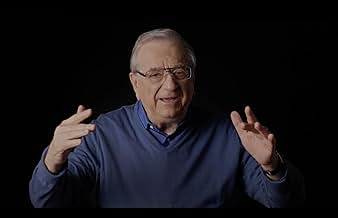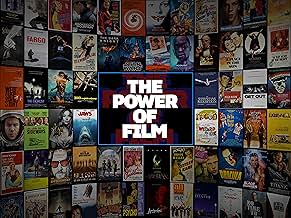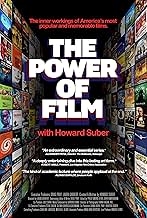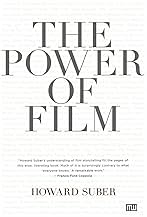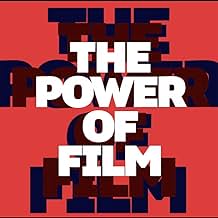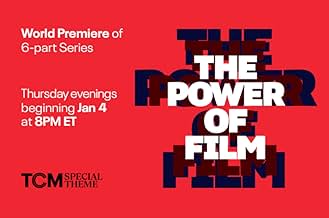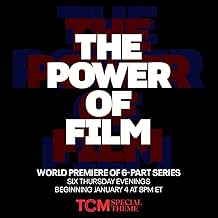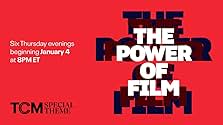Aggiungi una trama nella tua linguaDives deep into the art of storytelling by examining the defining principles and inner workings of the most popular and memorable American films of all time.Dives deep into the art of storytelling by examining the defining principles and inner workings of the most popular and memorable American films of all time.Dives deep into the art of storytelling by examining the defining principles and inner workings of the most popular and memorable American films of all time.
- Star
Sfoglia gli episodi
Recensioni in evidenza
"The Power of Film" is an Incredibly succinct, refined, distilled, and evidence-based look at what makes a good story on screen. If I were an inexperienced woodworker, and this series were about saws, after watching it there would not be a lot standing between me and a viable career in carpentry. His analysis reaches back to the foundational achievements of the plays of ancient Greece, but he doesn't start there or end there. He updates them using this era's most memorable films, seamlessly, but starting from today and integrating backward. I learned so much about what makes great, enduring, archetypal comedy/tragedy stories, and then so much more about doing it on screen. Depicted in detail and depth is "What makes a modern immortal film.". I know it will delight writers, directors, and even cinematographers.
Personally, I have been mulling for years on an idea for a Sci-Fi story of novel/screenplay length. The idea is good, I felt, but I was getting nowhere with the execution. I watched "The Power of Film" by coincidence and by episode three I was thinking OMG WTF. The problems I was having were incredibly simple. Obvious, timeless and ubiquitous formulas were absent and when they were spelled out to me I was suddenly, fully deconstipated. I filled half of a tablet about what was really going on in my mind, what was missing. My story had been malformed and stunted by inexperience and lack of tools. You might think: "oh, he abandoned his grand vision in favour of formulaic tripe", but it was the very opposite.
I had tried to achieved a setting, a feeling, a loose plot, a grand vision, but a ton of ambiguity dominated it because of a lack of overarching form...I was lost inside scenes. This series revealed to me what I really wanted to say, and a greater plot emerged that actually made sense. I shared this with a peer and the next day they told me "I've been thinking about your story" and started asking questions about it. I finally had answers.
If you are an aspiring screenwriter or author, and you are stuck...these episodes are capable of un-sticking you. This series is an absolutely must-see for creators and consumers both.
Personally, I have been mulling for years on an idea for a Sci-Fi story of novel/screenplay length. The idea is good, I felt, but I was getting nowhere with the execution. I watched "The Power of Film" by coincidence and by episode three I was thinking OMG WTF. The problems I was having were incredibly simple. Obvious, timeless and ubiquitous formulas were absent and when they were spelled out to me I was suddenly, fully deconstipated. I filled half of a tablet about what was really going on in my mind, what was missing. My story had been malformed and stunted by inexperience and lack of tools. You might think: "oh, he abandoned his grand vision in favour of formulaic tripe", but it was the very opposite.
I had tried to achieved a setting, a feeling, a loose plot, a grand vision, but a ton of ambiguity dominated it because of a lack of overarching form...I was lost inside scenes. This series revealed to me what I really wanted to say, and a greater plot emerged that actually made sense. I shared this with a peer and the next day they told me "I've been thinking about your story" and started asking questions about it. I finally had answers.
If you are an aspiring screenwriter or author, and you are stuck...these episodes are capable of un-sticking you. This series is an absolutely must-see for creators and consumers both.
This series is designed to teach people about the elements that go into a successful and memorable film. As such, you get to look at (once again) clips from successful and memorable films. Introducing these films is a nice old man who apparently taught this subject to film makers for decades. He's obviously knowledgeable and has a certain charm, but whatever he is trying to communicate gets lost in his many detours and sidetracks.
Occasionally he manages to stay on track, and when he does this, he isn't necessarily correct. At one point (I can't remember where) he talks about the need for surprise and how repetition can be harmful to the film's impact. Nothing could be further from the truth. Repetition is a fundamental aspect of human life. Repetition is a fundamental aspect of human life. Freud wrote about it and called it the "repetition compulsion" and tied it to the basic death drive. It's the core of most comedies and the way in which most action films anticipate a dramatic confrontation. Gun fighters don't meet for the first time. You see them in matches and anticipate what is going to happen in the final match. Substitute gunfighters for chess champions, gymnists, etc. And you see the structure of most effective dramatic scenes.
Not a complete waste of time, and it's always fun to see memorable scenes even if you've seen them hundreds of times. Along the way there are some good observations.
Occasionally he manages to stay on track, and when he does this, he isn't necessarily correct. At one point (I can't remember where) he talks about the need for surprise and how repetition can be harmful to the film's impact. Nothing could be further from the truth. Repetition is a fundamental aspect of human life. Repetition is a fundamental aspect of human life. Freud wrote about it and called it the "repetition compulsion" and tied it to the basic death drive. It's the core of most comedies and the way in which most action films anticipate a dramatic confrontation. Gun fighters don't meet for the first time. You see them in matches and anticipate what is going to happen in the final match. Substitute gunfighters for chess champions, gymnists, etc. And you see the structure of most effective dramatic scenes.
Not a complete waste of time, and it's always fun to see memorable scenes even if you've seen them hundreds of times. Along the way there are some good observations.
This series offers some interesting things to think about but, it seems the professor's train of thought is all over the place. The same few films from more recent years are used from episode to episode, over and over as examples of what his point is. There are so many other films from the classic era that could have been used instead of so many repeat of contemporary films.
I does contain some interesting insights as to what might create a successful screenplay.
The video image of some of the clips at times has a strobing effect that was a bit off-putting.
I so wanted to love this series but it leaves me a bit flat.
I feel it was a missed opportunity to mine the wealth of film material from the past.
I've seen 5 of the 6 episodes so far.
I does contain some interesting insights as to what might create a successful screenplay.
The video image of some of the clips at times has a strobing effect that was a bit off-putting.
I so wanted to love this series but it leaves me a bit flat.
I feel it was a missed opportunity to mine the wealth of film material from the past.
I've seen 5 of the 6 episodes so far.
Wow.
This documentary gives us the screenwriting essentials. If you are a serious storyteller, it's a "must see.".
UCLA Professor Howard Suber gifts us with wisdom, from a lifetime of teaching graduate level screenwriting, at the top film school in the world.
Perfectly edited for the general public.
In Prof. Suber's honor, UCLA film students coined the term "HOSH Pivot." Which is an acronym for "Howard Suber's One Hour Pivot," spelled backwards. HOSH means the plot takes a dramatic turn, one hour into the film. Which is a key structure of every great film. Once you've a created a new vocabulary word, you're established as a historical figure.
This documentary is a treasure. Which should be replayed again and again.
This documentary gives us the screenwriting essentials. If you are a serious storyteller, it's a "must see.".
UCLA Professor Howard Suber gifts us with wisdom, from a lifetime of teaching graduate level screenwriting, at the top film school in the world.
Perfectly edited for the general public.
In Prof. Suber's honor, UCLA film students coined the term "HOSH Pivot." Which is an acronym for "Howard Suber's One Hour Pivot," spelled backwards. HOSH means the plot takes a dramatic turn, one hour into the film. Which is a key structure of every great film. Once you've a created a new vocabulary word, you're established as a historical figure.
This documentary is a treasure. Which should be replayed again and again.
I am finding this documentary to be very powerful and enjoyably enlightening. Howard Suber has taught film classes at UCLA for 50 years, and he offers insights into writing, directing, characterization, fate and destiny, heroes and villains.
There are numerous clips from all kinds of movies as Professor Suber himself talks directly to the camera about whatever the subject may be. I was a TCF (telecommunications and film) major myself while in college in the mid-1970s, and I had some excellent professors, but listening to this man actually makes me want to take a class from him even today.
This is a superb documentary on TCM and hosted by Dave Karger, who is able to speak to director of the series, Laura Gabbert, and to writer, Doug Pray, both of whom had Suber as a professor in college. Simply well done all around.
There are numerous clips from all kinds of movies as Professor Suber himself talks directly to the camera about whatever the subject may be. I was a TCF (telecommunications and film) major myself while in college in the mid-1970s, and I had some excellent professors, but listening to this man actually makes me want to take a class from him even today.
This is a superb documentary on TCM and hosted by Dave Karger, who is able to speak to director of the series, Laura Gabbert, and to writer, Doug Pray, both of whom had Suber as a professor in college. Simply well done all around.
I più visti
Accedi per valutare e creare un elenco di titoli salvati per ottenere consigli personalizzati
Dettagli
- Colore
Contribuisci a questa pagina
Suggerisci una modifica o aggiungi i contenuti mancanti

